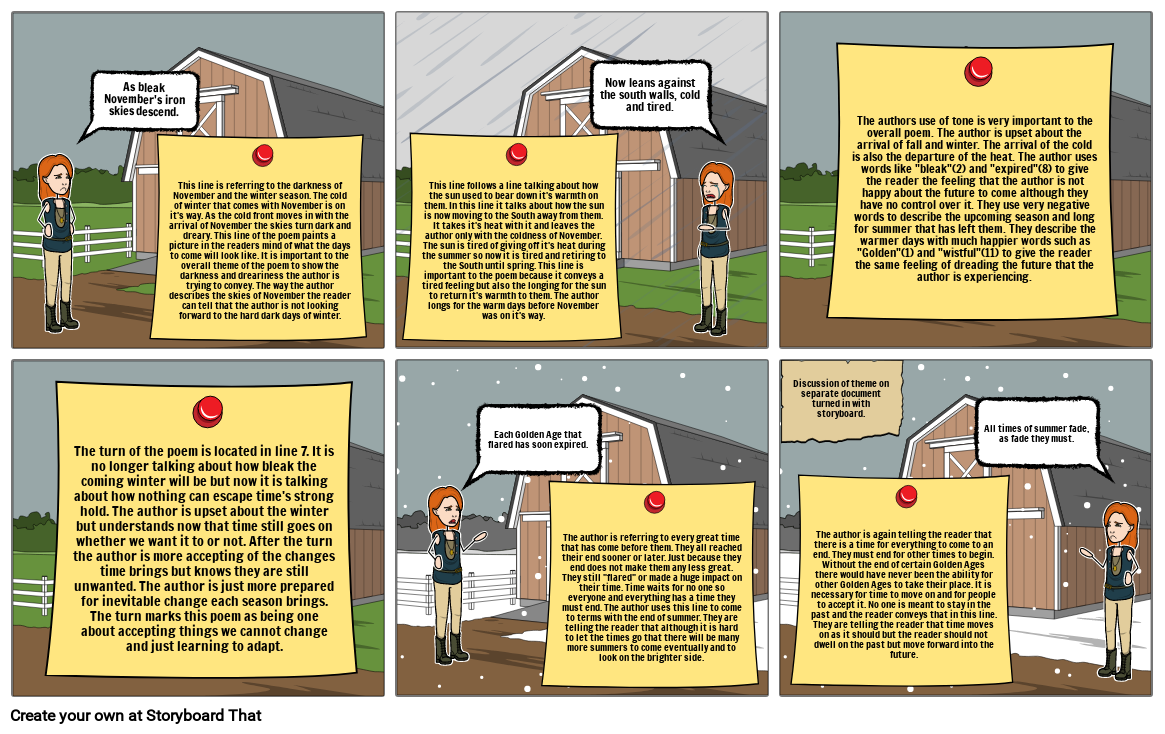test

Storyboard Text
- As bleak November's iron skies descend.
- This line is referring to the darkness of November and the winter season. The cold of winter that comes with November is on it's way. As the cold front moves in with the arrival of November the skies turn dark and dreary. This line of the poem paints a picture in the readers mind of what the days to come will look like. It is important to the overall theme of the poem to show the darkness and dreariness the author is trying to convey. The way the author describes the skies of November the reader can tell that the author is not looking forward to the hard dark days of winter.
- This line follows a line talking about how the sun used to bear down it's warmth on them. In this line it talks about how the sun is now moving to the South away from them. It takes it's heat with it and leaves the author only with the coldness of November. The sun is tired of giving off it's heat during the summer so now it is tired and retiring to the South until spring. This line is important to the poem because it conveys a tired feeling but also the longing for the sun to return it's warmth to them. The author longs for the warm days before November was on it's way.
- Now leans against the south walls, cold and tired.
- The authors use of tone is very important to the overall poem. The author is upset about the arrival of fall and winter. The arrival of the cold is also the departure of the heat. The author uses words like "bleak"(2) and "expired"(8) to give the reader the feeling that the author is not happy about the future to come although they have no control over it. They use very negative words to describe the upcoming season and long for summer that has left them. They describe the warmer days with much happier words such as "Golden"(1) and "wistful"(11) to give the reader the same feeling of dreading the future that the author is experiencing.
- The turn of the poem is located in line 7. It is no longer talking about how bleak the coming winter will be but now it is talking about how nothing can escape time's strong hold. The author is upset about the winter but understands now that time still goes on whether we want it to or not. After the turn the author is more accepting of the changes time brings but knows they are still unwanted. The author is just more prepared for inevitable change each season brings. The turn marks this poem as being one about accepting things we cannot change and just learning to adapt.
- Each Golden Age that flared has soon expired.
- The author is referring to every great time that has come before them. They all reached their end sooner or later. Just because they end does not make them any less great. They still "flared" or made a huge impact on their time. Time waits for no one so everyone and everything has a time they must end. The author uses this line to come to terms with the end of summer. They are telling the reader that although it is hard to let the times go that there will be many more summers to come eventually and to look on the brighter side.
- Discussion of theme on separate document turned in with storyboard.
- The author is again telling the reader that there is a time for everything to come to an end. They must end for other times to begin. Without the end of certain Golden Ages there would have never been the ability for other Golden Ages to take their place. It is necessary for time to move on and for people to accept it. No one is meant to stay in the past and the reader conveys that in this line. They are telling the reader that time moves on as it should but the reader should not dwell on the past but move forward into the future.
- All times of summer fade, as fade they must.
Over 30 Million Storyboards Created

